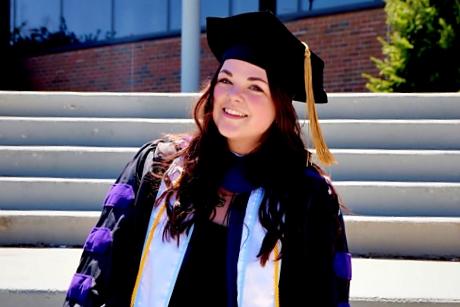Drawing the Line Between Talent and Desire
Hannah Devoe ’22 entered law school with a particular legal career path in mind. She left, confident and surefooted, on a completely different one.

Hannah Devoe ’22 came to RWU Law as an aspiring criminal lawyer. That aspiration was quickly put aside after her first criminal law classes, which she did not enjoy. But rather than panic, Devoe looked to her other classes, experiential learning opportunities, and extracurricular activities to guide her down a new path.
“In middle school and high school, teachers told me that I was good at arguing, at articulating what I was thinking,” she explains. “So, for a long time I believed that I was meant to be a lawyer. After my first semester, however, I realized I didn’t like the arguing piece of the law. I didn’t feel comfortable with the idea of standing up in front of people and having to think quickly on my feet.”
In essence, Devoe realized she had to draw a firm line between what she was good at and what she wanted to do with the rest of her life. And what she really wanted was to research and write about the law, taking deep dives into how laws impacted the larger societal picture.
“I enjoy figuring out what the law is and how it fits into the world in a different sense, beyond just how to argue a particular case,” says Devoe. “I’m drawn to the logic behind how the law is applied and how it fits into policy arguments and the international spectrum.”
Devoe’s love for—and aptitude for—researching and writing about law made her a natural fit for the Roger Williams University Law Review. Indeed, she ultimately served as Editor-in-Chief of the publication, shepherding through the work of other students and overseeing content for each of the three issues published over the course of the year. At the same time, she also continued to hone her own skills in evaluating and communicating about the law.
“The role of editor is multifaceted,” she notes. “The experience was a fantastic and I learned a lot about many areas of the law.”
‘School will give you a well-rounded legal education, but there’s nothing like being in the office, in the workforce, and putting those skills to the test.’
In addition to her work on law review and in the classroom, Devoe availed herself of experiential learning opportunities that reinforced for her the importance of truly understanding what you want to do and where and how you want to do it.
“I think experiential learning is absolutely essential because it teaches you things you could never learn in the classroom,” says Devoe. “School will give you a well-rounded legal education, but in terms of where you could see yourself practicing, there’s nothing like being in the office, in the workforce, and putting those skills to the test.”
Two opportunities in particular helped put Devoe on the path to her future in the law. While interning at Textron, Inc., she saw the law at work in a corporate setting, which very much appealed to her. And her time with the Defense Institute of International Legal Studies exposed her to the international side of law, particularly in relation to government, politics, and the military.
Devoe now has a pretty idea of her desired career path. She plans to work in corporate law—but first, she wants to build on her education. After sitting for the bar this summer, she headed to the UK, where she is pursuing a Master of Laws in International Commercial Law at University College London. Her goal is to focus in on the corporate side of the law, but on the international spectrum. Upon completing the program, Devoe looks forward to joining a corporation and digging deep for what she sees as her one, single client.
“I like the idea of looking at a multitude of legal issues for just one client—as opposed to litigators, public defenders, and so on, who have a multitude of clients and deal with a multitude of issues on their behalf,” says Devoe. “At a large corporation or multinational conglomerate, you have to determine how your corporation fits into the law for multiple states and, potentially, multiple countries. There’s shipping and trade and trading on markets overseas. That kind of puzzle is really interesting to me and what I want to focus on.”
So, while she entered law school planning to forge one career path, she left confident and surefooted on another. And she gives her alma mater a great deal of credit for helping her make that transition.
“The best part about going to RWU Law is that it gives you the opportunity to do everything,” she says. “From being Editor-in-Chief of the Law Review, to experiencing a multitude of internships and TA opportunities that help you figure out what you really want, my experience there was absolutely wonderful.”
